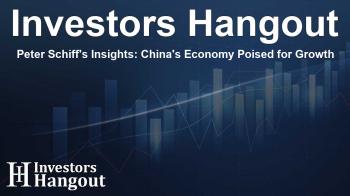Peter Schiff's Insights: China's Economy Poised for Growth

Peter Schiff Challenges Conventional Views
Economist Peter Schiff has recently made headlines by critiquing the views of Treasury Secretary Scott Bessent on U.S.-China trade relations. Schiff believes that China's strategy to diminish its dependence on American markets will actually serve to bolster its economy.
Bessent's Perspective on Trade Relations
Understanding Bessent's Argument
In a recent social media post, Schiff commented, stating, "Scott Bessent has it backwards." He emphasized that China's initiative to trade less with the U.S. and more with global partners is likely to ignite a significant economic boom.
The Implications of Trade Strategies
Schiff went on to articulate the necessity of engaging with customers who can sufficiently afford products. He reflects on the ramifications of America's ever-increasing federal debt and the associated burdens it imposes due to interest payments. This has raised concerns about the stability of the U.S. dollar, a point Schiff has continuously highlighted.
The Reality of Trade Dynamics
Elaborating further, Schiff stressed that payment for imports fundamentally arises from exports. He pointed out that the U.S. currently lacks the production capacity to fulfill the demand for goods that China requires, while other countries are stepping in to fill this void. This brings to light the growing interdependence of global trade—not just between the U.S. and China, but involving a myriad of nations.
The Broader Economic Landscape
Schiff's statements were in response to Bessent's comments made during a CNBC forum, where he asserted that China's narrative on U.S. actions was misguided. Bessent labeled the current situation as a face-off between China and the rest of the world, not solely a bilateral issue.
Shifting Trade Patterns: China's Exports on the Rise
Despite facing challenges in trade with the U.S., China's export figures tell a different story. Notably, other destinations were reported to have experienced an increase in imports from China, with total exports markedly rising despite the declining sales to the U.S. market.
Expert Opinions on Trade Consequences
Economist Jim Cramer expressed concerns that the tariffs imposed by the previous U.S. administration were having unintended consequences. He noted that China is adapting to these tariffs and learning to thrive without relying heavily on U.S. markets. Recent data revealed that China's exports to other nations grew significantly, while its sales to the U.S. experienced a stark reduction.
America's Vulnerability in Trade Relations
Economist Paul Krugman echoed worries regarding America's reliance on Chinese exports for crucial materials, such as rare earth metals. He stated that while the U.S. might struggle, China possesses the capability to stimulate its domestic demand to mitigate the effects of lost exports.
Conclusion: The Future of U.S.-China Trade
As we observe the shifting dynamics in trade and economic strategies, it becomes apparent that the dialogue surrounding U.S.-China relations continues to evolve. Schiff’s insights highlight a critical understanding of the broader economic landscape that is in flux. With multiple nations involved in this intricate web of trade, future developments will undoubtedly shape global markets.
Frequently Asked Questions
What is Peter Schiff's main argument regarding China's economy?
Peter Schiff believes that as China reduces its reliance on U.S. markets, its economy will actually strengthen and grow.
What did Scott Bessent say about U.S.-China trade relations?
Bessent argued that China's perception of U.S. actions is inaccurate and emphasized that the trade issue is more complex than a simple U.S.-China conflict.
How are China's exports performing in relation to the U.S.?
China's exports to other countries have surged, while its exports to the U.S. have significantly declined, indicating a shift in trading partners.
What concerns did Jim Cramer raise about tariffs?
Cramer pointed out that tariffs are causing China to adapt and become less dependent on U.S. imports, which could backfire for America.
What does Paul Krugman suggest about America's economic position?
Krugman suggests that the U.S. is more vulnerable in trade relations because it relies heavily on China for essential inputs and materials.
About The Author
Contact Caleb Price privately here. Or send an email with ATTN: Caleb Price as the subject to contact@investorshangout.com.
About Investors Hangout
Investors Hangout is a leading online stock forum for financial discussion and learning, offering a wide range of free tools and resources. It draws in traders of all levels, who exchange market knowledge, investigate trading tactics, and keep an eye on industry developments in real time. Featuring financial articles, stock message boards, quotes, charts, company profiles, and live news updates. Through cooperative learning and a wealth of informational resources, it helps users from novices creating their first portfolios to experts honing their techniques. Join Investors Hangout today: https://investorshangout.com/
The content of this article is based on factual, publicly available information and does not represent legal, financial, or investment advice. Investors Hangout does not offer financial advice, and the author is not a licensed financial advisor. Consult a qualified advisor before making any financial or investment decisions based on this article. This article should not be considered advice to purchase, sell, or hold any securities or other investments. If any of the material provided here is inaccurate, please contact us for corrections.

